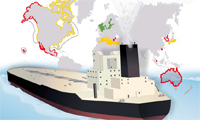Teamwork that matters
The International Maritime Organization has vowed to make significant cuts in emissions from ocean-going vessels. Alfa Laval has teamed up with two market leaders to offer pioneering solutions to address this global issue.
DATE 2024-05-03 AUTHOR James Pearse, David WilesGlobalization has intensified trade betweenthe East and West, and today some 90 percent of the resulting cargo is transported by sea.While sea freight is cost-efficient and compares favourably with other means of transport in terms of overall gas emissions, some specific air pollutants are a cause of concern.
Thus the industry is investing heavily to improve its environmental performance. Two key groups of pollutants that are being targeted by the shipping industry are sulphur oxides (SOx) and nitrogen oxides (NOx), which harm both human health and the environment.
The International Maritime Organization (IMO) has vowed to cut emissions of these compounds – in the case of NOx by 80 percent – in certain geographic areas, known as emission control areas (ECAs).
With its high-speed separator technology, Alfa Laval is collaborating with other leading engineering companies to find the solutions needed to make such reductions possible. Staffan Konigsson, process analysis and design expert at Alfa Laval, says he is confident these measures will help change the way the shipping industry works. “[Using high-speed separators] we are breaking new ground, as other solutions simply don’t work with such small particles,” he says. “It is a very challenging project to minimize waste volume on this scale.”
NOx are formed during the combustion process as a result of the combination of nitrogen and oxygen from the air at high temperatures. They cause acid rain, which in turn causes acidification and over-fertilization of the sea and land. In a project to reduce these emissions from ships’ engines, Alfa Laval was selected to collaborate with the Danish arm of German giant MAN.
The engine builder is currently developing and testing technology in the exhaust gas recirculation (EGR) system for large two-stroke diesel engines that can reduce NOx emissions by 80 percent. As part of this system, a scrubber removes sulphur and particles from the exhaust gas using jets of water. Alfa Laval’s separator solution aims to then purify this water so that it does not interfere with the EGR process, and at the same time it achieves the IMO directive on the purity of water discharged into the sea.
“MAN has found Alfa Laval separators very promising,”
says Johan Kaltoft, MAN diesel and turbo project manager. “[Once the NOx-reducing technology is completed] we expect to fully meet the IMO criteria for the discharge of scrubber wash water, while keeping the EGR scrubber system in a clean and stable running condition.” Lena Sundquist, Alfa Laval’s market unit manager for Marine & Diesel, explains: “Because of the results from the land-based research, we were invited to be part of the ongoing tests on board the container ship from AP Moller-Maersk, which will take place over one to two years.”
SOx forms during the combustion process when sulphur in the fuel combines with oxygen. Besides contributing to acid rain, SOx in high concentrations can impair lung function in humans.
Alfa Laval has teamed up with scrubber producer Aalborg Industries, a specialist in SOx-capturing technology, to reduce these emissions.
Aalborg’s scrubber, the largest marine unit installed today, was installed on a North Sea RO-RO Vessel in 2009, and in May 2010 it was tested on seawater for the first time. Alfa Laval high-speed separators clean the dirty water coming from the scrubber.Lars Munch Antonsen, general manager, Group Global Marketing & Customer Relations Management at Aalborg Industries A/S, says he is pleased with the progress Alfa Laval is making.
“Alfa Laval is a well-known player in the maritime industry and was chosen because of its proven skills in designing equipment for the merchant fleet and its expertise in the separation of fluids and particles.”
At Alfa Laval, Sundquist says that the separator solution has proved so successful that she is confident that the results of the project will fully comply with IMO targets on discharge water from the treatment of both NOx and SOx emissions.
Regulations concerning sulphur oxides and nitrogen oxides
1. Regulations include caps on the sulphur content of fuel oil
as a measure to control sulphur oxides (SOx) emissions. Special fuel-quality provisions exist for SOx in emission control areas (ECAs). Fuel sulphur limits (FSL) in ECAs are currently set at 1.0 percent. At the global level they are currently being reduced from 4.5 percent to 3.5 percent. By 2015, FSL in ECAs will stand at 0.1 percent (with global limits set for further reduction, from 3.5 percent to 0.5 percent by 2020).
2. The MARPOL Annex VI legislation, which went into effect in May 2005 following specifications from several European Union directives, has curbed the impact of marine diesel on the environment. By 2015, countries that form part of an ECA will start imposing a FSL of 0.10 percent (1,000 ppm), and by 2016 newly installed marine diesel engines must comply with a NOx cap of 3.4 g/kWh when operating within an ECA and 14.4g/kWh when operating outside an ECA.

Customer's voice
We expect to fully meet the IMO criteria for the discharge of scrubber wash water.
Johan Kalt oft,
MAN Diesel
